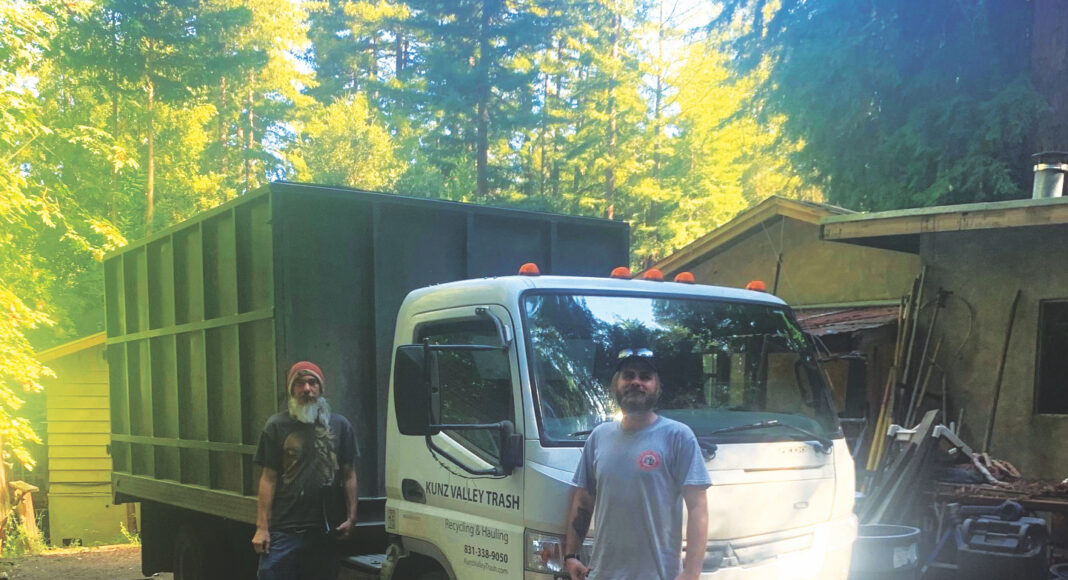A Boulder Creek trash and recycling collector that hadn’t been paying the money it owed the County of Santa Cruz—or keeping up with regulations—has lost the right to work in Santa Cruz County.
The owner of Kunz Valley Trash, 66-year-old Jack Kunz, says he’ll now be forced to drive to San Mateo County to build his business after officials brought the hammer down.
“We got behind in our payment to the County, partly because of Covid, partly because of the CZU fire and partly because of some medical issues that my wife had—several surgeries and three near-death experiences in the hospital,” he says, adding he had a mild heart attack in April. “They had an excuse to get rid of us, and they used it, basically.”
Kunz was off the route as of Aug. 1, and some customers faced significant increases. They’re switched to San Jose-based GreenWaste Recovery, the company already contracting with the County.
Summit Waste & Recycling, another small outfit serving mountain residents, may also pick up some of Kunz’s former clients. However, according to the County’s director of community development and infrastructure Matt Machado, they’re not obligated.
He says the County’s been attempting to get Kunz to pay up and to stop breaking state laws—like the one that says you have to pick up refuse weekly.
“Jack wasn’t compliant with the old law and was even further away from compliance with the new law,” he says, referencing the new green waste mandate, Senate Bill 1383, which came into force in January.
Kunz admits he hasn’t been above board with everything and says he never understood why “weekly” collections were required.
With the surgeries, hospital stays and the dire economic landscape, he says he didn’t have the time to complete all the paperwork he’d agreed to submit to the County.
For example, he collects between 40-60 “tags” monthly. The tags are supposed to be sent in, but he says he doesn’t have enough time.
According to Kunz, while he hasn’t furnished the County with the official forms, the tags are all listed on the monthly checks he claims to be filing.
Machado says the County has not received its dues.
“It’s been three years where he has not paid his franchise fees, nor has he been compliant with state or local laws,” he says.
The way Kunz sees it, the County saw a vulnerable small business owner and is swooping into hand over his around 500 customers to GreenWaste, who—because they charge more—fork over more cash to the government.
But the County says it didn’t know Kunz had that many customers because the company hasn’t been sharing its data.
Kunz says that some addresses had been paying $5.95 a month, noting their regular 35-gallon rate is $6.50 per bin.
The County says if Kunz had been doing weekly pickups like they’re supposed to, that $6.50 per week rate wouldn’t be far off from GreenWaste’s pricing—it charges $24.62 per month for 20-gallon service, $33.99 per month for 32-gallon service, $67.89 per month for 64-gallon service and $101.77 per month for 96-gallon service (with recyclables and organics included).
GreenWaste was handed a business with monthly revenues estimated at approximately $20,000, County and Kunz officials say. The franchise fee rate is 10%, Kunz notes.
In addition to getting hit with base rate increases, former Kunz customers living in difficult-to-access areas can also expect to be dinged with more fees.
While Kunz would drive up meandering roads for no extra cost, GreenWaste will charge $14.38 a month—although they’ve agreed to reduce this by 27% until they figure out what expenses this entails.
Kunz has long prided itself on being able to go where GreenWaste’s bigger, bulkier trucks could not.
“We went right to their house,” Kunz says. “Our business plan was we only charged you for what we picked up. Every garbage company in the world would tell you we’re leaving money on the table.”
But while GreenWaste has been purchasing more agile vehicles, Kunz says he spent so much money repairing one truck that he could’ve bought two new ones.
Machado says because Kunz relied on the County’s Ben Lomond transfer station—which doesn’t accept certain recyclables, including some types of paper—GreenWaste can keep more items out of landfills.
“Waste diversion is a huge deal,” he says, referencing the increased contamination scrutiny coming from China, which had been laxer about the quality of recyclables it would accept. “Recycling is complicated today because of some of the worldwide policies.”
Kunz says it wasn’t uncommon for trash and recycling to get jumbled up in his truck, but he claims the County isn’t as green as it pretends to be.
He says he was charged around 75% extra during a dump run on Nov. 3 last year because a 3,360-pound load of trash was contaminated by accident with concrete siding that was supposed to be recycled.
And yet, he says he saw a piece of heavy equipment push the wall material in with the rest of the garbage—instead of organizing it in the recycling pile.
“They just left it in there,” he says. “I’m telling you; they did not take it out of the pile and put it where it belongs.”
Machado says he doubts that happened.













